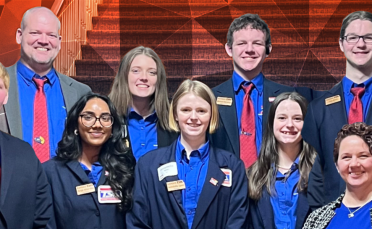What Are the Options After High School?

Whether you have a toddler or a teen in your life, thinking about their future can feel daunting! Helping them transition into the “real world” is a big task, and there are a seemingly endless number of options after high school — how are you supposed to help them find the right path?
A common problem when talking about the possibilities with our kids is forgetting to explore every avenue. After all, the road to success is different for each person.
Many adults take for granted that kids understand what all of the options mean, so we made this guide to help you discuss with your children or your students!
Apprenticeships
Apprenticeship programs allow the trainee (apprentice) to earn a wage while learning from an experienced mentor and taking relevant classes. Since they’re earning a paycheck, apprentices are usually able to complete the program without ending up in debt. Graduates of apprenticeship programs typically advance within their company more rapidly than others do and can move into supervisory positions in a few years.
Thousands of employers in many industries across Kansas offer apprenticeship programs. To learn more and apply to a program, check out the KANSASWORKS Office of Registered Apprenticeships.
Careers to pursue through an apprenticeship include (but are not limited to):
Community College
Community colleges are public higher education institutions that offer affordable college courses. Typically, the highest degree available at a community college is an associate degree, and most colleges offer additional certificate programs and specialized classes.
Many students begin their higher education journey at a community college to knock out prerequisites or intro-level courses before transferring to a larger university. This path saves money and allows students a slower transition into bigger — and often more strenuous — environments at a four-year college. Ultimately, attending a university isn’t always required, though! There are many companies across Kansas looking for folks with associate degrees.
Through the Kansas Promise Scholarship, eligible students studying select fields (currently information technology and security, health care, advanced manufacturing and building trades, early childhood education and others) can get their community college tuition paid for! Learn more about the scholarship today.
Careers to pursue through community college include (but are not limited to):
- Dental hygienist
- Medical imaging technologist
- Paralegal and legal assistant
- Physical therapist assistant
- Teacher assistant and paraeducator
Four-Year Colleges and Universities
Four-year colleges and universities are higher education institutions that offer multiple programs for students to earn bachelor’s degrees. Advanced degrees (master’s or Ph.D. programs) are also available. Universities often require students to take classes outside of their chosen discipline to broaden their general knowledge and provide a well-rounded education.
Some career fields require students to gain even more professional study (like attending medical school or law school) through graduate programs or require that they pass a state licensure exam to practice (like nursing or accounting).
Traditionally, students attending four-year universities begin by living in the residence halls or other on-campus housing. With larger class sizes and student bodies, universities are a great place for kids to meet new people and broaden their horizons.
Careers that might require a bachelor's degree include (but are not limited to):
- Accountant
- Civil engineer
- Human resources specialist
- Middle school teacher
- Personal financial advisor
- Social worker
Military Service
The United States military includes the Air Force, Army, Coast Guard, Marine Corps, Navy and Space Force. These branches protect and defend our country and citizens and promote peace around the world. Military service offers discipline, opportunity for advancement and competitive wages for people who want to serve their country. Each military branch provides some form of higher education tuition assistance in exchange for service, offering a path towards a debt-free degree.
The military branches have reserve forces, too, where service members perform duties part time while working full-time civilian jobs. Veterans are in-demand employees and become assets to any team they join.
People in the military often learn career skills that are helpful in the civilian workforce, such as jobs in aviation, medicine, engineering, construction or maintenance and repair of vehicles and machinery.
Careers in the military include (but are not limited to):
- Cybersecurity specialist
- Engineer
- Helicopter pilot
- Infantry soldier
- Linguist
- Special forces officer
On-the-Job Training
For on-the-job training, employees are hired without having the technical skills required for the position. Instead, the newly hired team member is trained by their employer to do the job.
As they watch others do the job and gain hands-on experience, employees grow into their job title and learn everything they need to be successful.
Careers to pursue through on-the-job training include (but are not limited to)
- Animal caretaker
- Automotive repairer
- Childcare worker
- Electrical line installer and repairer
- Heavy and tractor trailor driver
- Sheet metal worker
No matter which road your child decides to take, the most important thing for you to do is be supportive! A fulfilling, stable future can be found through any — or a combination of all! — of the options above.



